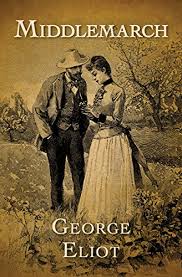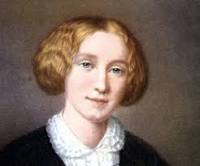Middlemarch Page #17
Middlemarch, A Study of Provincial Life is a novel by the English author George Eliot, appearing in eight instalments in 1871 and 1872. Set in a fictitious Midlands town from 1829 to 1832, it follows distinct, intersecting stories with many characters.
“What do you mean, Mrs. Cadwallader?” said Sir James. His fear lest Miss Brooke should have run away to join the Moravian Brethren, or some preposterous sect unknown to good society, was a little allayed by the knowledge that Mrs. Cadwallader always made the worst of things. “What has happened to Miss Brooke? Pray speak out.” “Very well. She is engaged to be married.” Mrs. Cadwallader paused a few moments, observing the deeply hurt expression in her friend’s face, which he was trying to conceal by a nervous smile, while he whipped his boot; but she soon added, “Engaged to Casaubon.” Sir James let his whip fall and stooped to pick it up. Perhaps his face had never before gathered so much concentrated disgust as when he turned to Mrs. Cadwallader and repeated, “Casaubon?” “Even so. You know my errand now.” “Good God! It is horrible! He is no better than a mummy!” (The point of view has to be allowed for, as that of a blooming and disappointed rival.) “She says, he is a great soul.—A great bladder for dried peas to rattle in!” said Mrs. Cadwallader. “What business has an old bachelor like that to marry?” said Sir James. “He has one foot in the grave.” “He means to draw it out again, I suppose.” “Brooke ought not to allow it: he should insist on its being put off till she is of age. She would think better of it then. What is a guardian for?” “As if you could ever squeeze a resolution out of Brooke!” “Cadwallader might talk to him.” “Not he! Humphrey finds everybody charming. I never can get him to abuse Casaubon. He will even speak well of the bishop, though I tell him it is unnatural in a beneficed clergyman; what can one do with a husband who attends so little to the decencies? I hide it as well as I can by abusing everybody myself. Come, come, cheer up! you are well rid of Miss Brooke, a girl who would have been requiring you to see the stars by daylight. Between ourselves, little Celia is worth two of her, and likely after all to be the better match. For this marriage to Casaubon is as good as going to a nunnery.” “Oh, on my own account—it is for Miss Brooke’s sake I think her friends should try to use their influence.” “Well, Humphrey doesn’t know yet. But when I tell him, you may depend on it he will say, ‘Why not? Casaubon is a good fellow—and young—young enough.’ These charitable people never know vinegar from wine till they have swallowed it and got the colic. However, if I were a man I should prefer Celia, especially when Dorothea was gone. The truth is, you have been courting one and have won the other. I can see that she admires you almost as much as a man expects to be admired. If it were any one but me who said so, you might think it exaggeration. Good-by!” Sir James handed Mrs. Cadwallader to the phaeton, and then jumped on his horse. He was not going to renounce his ride because of his friend’s unpleasant news—only to ride the faster in some other direction than that of Tipton Grange. Now, why on earth should Mrs. Cadwallader have been at all busy about Miss Brooke’s marriage; and why, when one match that she liked to think she had a hand in was frustrated, should she have straightway contrived the preliminaries of another? Was there any ingenious plot, any hide-and-seek course of action, which might be detected by a careful telescopic watch? Not at all: a telescope might have swept the parishes of Tipton and Freshitt, the whole area visited by Mrs. Cadwallader in her phaeton, without witnessing any interview that could excite suspicion, or any scene from which she did not return with the same unperturbed keenness of eye and the same high natural color. In fact, if that convenient vehicle had existed in the days of the Seven Sages, one of them would doubtless have remarked, that you can know little of women by following them about in their pony-phaetons. Even with a microscope directed on a water-drop we find ourselves making interpretations which turn out to be rather coarse; for whereas under a weak lens you may seem to see a creature exhibiting an active voracity into which other smaller creatures actively play as if they were so many animated tax-pennies, a stronger lens reveals to you certain tiniest hairlets which make vortices for these victims while the swallower waits passively at his receipt of custom. In this way, metaphorically speaking, a strong lens applied to Mrs. Cadwallader’s match-making will show a play of minute causes producing what may be called thought and speech vortices to bring her the sort of food she needed. Her life was rurally simple, quite free from secrets either foul, dangerous, or otherwise important, and not consciously affected by the great affairs of the world. All the more did the affairs of the great world interest her, when communicated in the letters of high-born relations: the way in which fascinating younger sons had gone to the dogs by marrying their mistresses; the fine old-blooded idiocy of young Lord Tapir, and the furious gouty humors of old Lord Megatherium; the exact crossing of genealogies which had brought a coronet into a new branch and widened the relations of scandal,—these were topics of which she retained details with the utmost accuracy, and reproduced them in an excellent pickle of epigrams, which she herself enjoyed the more because she believed as unquestionably in birth and no-birth as she did in game and vermin. She would never have disowned any one on the ground of poverty: a De Bracy reduced to take his dinner in a basin would have seemed to her an example of pathos worth exaggerating, and I fear his aristocratic vices would not have horrified her. But her feeling towards the vulgar rich was a sort of religious hatred: they had probably made all their money out of high retail prices, and Mrs. Cadwallader detested high prices for everything that was not paid in kind at the Rectory: such people were no part of God’s design in making the world; and their accent was an affliction to the ears. A town where such monsters abounded was hardly more than a sort of low comedy, which could not be taken account of in a well-bred scheme of the universe. Let any lady who is inclined to be hard on Mrs. Cadwallader inquire into the comprehensiveness of her own beautiful views, and be quite sure that they afford accommodation for all the lives which have the honor to coexist with hers. With such a mind, active as phosphorus, biting everything that came near into the form that suited it, how could Mrs. Cadwallader feel that the Miss Brookes and their matrimonial prospects were alien to her? especially as it had been the habit of years for her to scold Mr. Brooke with the friendliest frankness, and let him know in confidence that she thought him a poor creature. From the first arrival of the young ladies in Tipton she had prearranged Dorothea’s marriage with Sir James, and if it had taken place would have been quite sure that it was her doing: that it should not take place after she had preconceived it, caused her an irritation which every thinker will sympathize with. She was the diplomatist of Tipton and Freshitt, and for anything to happen in spite of her was an offensive irregularity. As to freaks like this of Miss Brooke’s, Mrs. Cadwallader had no patience with them, and now saw that her opinion of this girl had been infected with some of her husband’s weak charitableness: those Methodistical whims, that air of being more religious than the rector and curate together, came from a deeper and more constitutional disease than she had been willing to believe.
Translation
Translate and read this book in other languages:
Select another language:
- - Select -
- 简体中文 (Chinese - Simplified)
- 繁體中文 (Chinese - Traditional)
- Español (Spanish)
- Esperanto (Esperanto)
- 日本語 (Japanese)
- Português (Portuguese)
- Deutsch (German)
- العربية (Arabic)
- Français (French)
- Русский (Russian)
- ಕನ್ನಡ (Kannada)
- 한국어 (Korean)
- עברית (Hebrew)
- Gaeilge (Irish)
- Українська (Ukrainian)
- اردو (Urdu)
- Magyar (Hungarian)
- मानक हिन्दी (Hindi)
- Indonesia (Indonesian)
- Italiano (Italian)
- தமிழ் (Tamil)
- Türkçe (Turkish)
- తెలుగు (Telugu)
- ภาษาไทย (Thai)
- Tiếng Việt (Vietnamese)
- Čeština (Czech)
- Polski (Polish)
- Bahasa Indonesia (Indonesian)
- Românește (Romanian)
- Nederlands (Dutch)
- Ελληνικά (Greek)
- Latinum (Latin)
- Svenska (Swedish)
- Dansk (Danish)
- Suomi (Finnish)
- فارسی (Persian)
- ייִדיש (Yiddish)
- հայերեն (Armenian)
- Norsk (Norwegian)
- English (English)
Citation
Use the citation below to add this book to your bibliography:
Style:MLAChicagoAPA
"Middlemarch Books." Literature.com. STANDS4 LLC, 2024. Web. 25 Nov. 2024. <https://www.literature.com/book/middlemarch_242>.




Discuss this Middlemarch book with the community:
Report Comment
We're doing our best to make sure our content is useful, accurate and safe.
If by any chance you spot an inappropriate comment while navigating through our website please use this form to let us know, and we'll take care of it shortly.
Attachment
You need to be logged in to favorite.
Log In